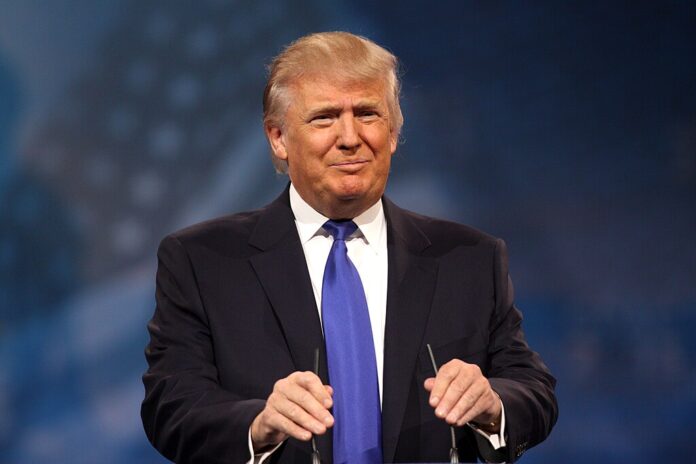Former economic adviser Steve Moore proposes Musk head a new commission focused on eliminating wasteful federal programs, sparking debates over potential conflicts of interest
Former President Donald Trump is considering appointing Tesla CEO Elon Musk to head a committee dedicated to identifying and eliminating wasteful government programs if he secures a second term in office. This proposal comes as part of Trump’s strategy to bring in prominent corporate leaders to help streamline government operations and cut costs.
The idea of appointing Musk to this role was put forward by Steve Moore, Trump’s former economic adviser. Moore advocates for the creation of a “blue ribbon” commission aimed at scrutinizing and reducing federal spending. According to reports from The Washington Post, Moore believes this initiative should be a top priority if Trump returns to the White House.
Embed from Getty ImagesElon Musk has already expressed his enthusiasm for such a position. During a recent conversation with Trump on X, Musk endorsed the concept of a government efficiency commission, emphasizing the importance of ensuring taxpayer money is used effectively. Musk even went as far as to post an AI-generated image of himself at a podium labelled “Department of Government Efficiency,” and publicly stated his willingness to serve on such a commission.
However, Musk’s potential appointment has sparked concerns regarding conflicts of interest. Musk’s companies, including SpaceX and Tesla, are significant recipients of federal funds. SpaceX, for example, has secured substantial contracts from NASA, while Tesla has benefited from federal support. Given the Republican push for increased investment in space technology and satellite programs, critics worry that Musk’s involvement could lead to biased outcomes favouring his own business interests.
Anna Massoglia, a political finance expert at OpenSecrets, raised concerns about the possible conflict of interest, suggesting that the commission’s mandate to save taxpayer dollars could be compromised if Musk’s companies stand to gain from federal spending. Massoglia emphasized the need for stringent accountability measures to prevent private sector members from exploiting their positions for personal gain.
In response to speculation about Musk’s potential role, Trump has attempted to address the concerns. On The Shawn Ryan Show, Trump noted that while Musk is eager to contribute, his current responsibilities in managing large businesses might limit his ability to take on a formal role. Trump suggested that Musk could serve in an advisory capacity, providing valuable insights without being directly involved in the administration.
This stance contrasts with Trump’s earlier remarks, where he expressed openness to appointing Musk to a significant position, praising him as a “brilliant guy” and indicating he would “certainly” consider him for a cabinet or advisory role. Trump’s mixed messages highlight the complexities surrounding Musk’s potential involvement and the broader implications for government efficiency and private sector influence.
Analysis:
Political: The potential appointment of Elon Musk to lead a government efficiency committee under a Trump administration raises significant political questions. It reflects Trump’s strategy of leveraging high-profile business figures to address perceived inefficiencies within government. This approach could influence the political discourse on government spending and reform. However, it also opens up debates about the intersection of business and politics, particularly regarding how private sector interests might shape public policy.
Social: The proposal taps into broader societal concerns about government efficiency and accountability. The public’s reaction to Musk’s potential appointment will likely be mixed, reflecting both admiration for his business acumen and scepticism about the influence of corporate leaders in public governance. The conversation around government waste and fiscal responsibility resonates with voters who are concerned about how their tax dollars are spent, amplifying the social impact of this potential appointment.
Racial: While the specific issue of Musk’s appointment does not directly relate to racial issues, it is part of a larger discussion about equity in government spending. Ensuring that all communities benefit fairly from government programs and investments is crucial. There may be concerns about whether a business-oriented approach to government efficiency will address or exacerbate existing disparities in how federal funds are distributed and used.
Gender: The gender implications of Musk’s potential role are less direct but still relevant. The involvement of high-profile male executives in government roles often highlights the broader issue of gender representation in positions of power. Efforts to increase diversity and inclusivity in government appointments can be overshadowed by the focus on prominent male figures, potentially influencing the broader conversation about gender equity in leadership roles.
Economic: The economic implications of Musk leading a committee focused on cutting government spending are substantial. His involvement could influence decisions that impact federal contracts and funding allocations. Concerns about conflicts of interest are significant, given Musk’s companies’ reliance on federal support. The potential for Musk’s businesses to benefit from government decisions underscores the need for clear boundaries and transparency in such appointments to ensure that economic policies serve the broader public interest rather than specific private gains.
